Free Shipping on $100+ orders. Take a look at past and present Blog posts for coupons!
This high quality oven hardening clay is particularly suitable for filigree work because it is dimensionally stable and firm enough to maintain fine hard edges when baked. Colors are formulated to easily mix with one another but at the same time, maintaining their original sharp color shade with no visual smearing or bleeding. This clay contains pure beeswax and premium quality pigments and is condensation resistant. Easy to condition colors. Pardo Art Clay comes in true vibrant colors that are extremely strong and maintains color after baking.
Ginger Davis Allman - The Blue Bottle Tree - did extensive comparison testing with the different brands of translucent clays. Click to read her findings here and here.
Please also take a look at the article written by Ginger at The Blue Bottle Tree:
"It’s easy to assume that your clay has been partially cured or is old. But hold on! There is a trick to it. Pardo is not like other brands of polymer clay. Here’s how to condition Pardo Art Clay."
Betty Jo Hendershott graciously let me present the following experiments she has carried out. Scroll to the bottom to read more about Betty Jo.
I picked up a couple packages of Pardo Translucent Art Clay. I also purchased bronze, gold and silver metallic Pardo Jewellery Clay. I thought I would give these a try before I invested in a wider variety of colors.... though I was tempted to buy one of everything.
I purchased red, blue and purple flower canes from my friend Jackie. Jackie makes beautiful canes... I love her flowers and her kaleidoscope canes are amazing. Do yourself a favor and check out her Etsy shop, The Pleasant Pheasant
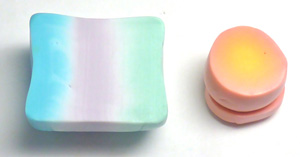

I'm not through with this one. I may add more to the top or bead around it. I love the way the flowers seem to be floating across the surface.
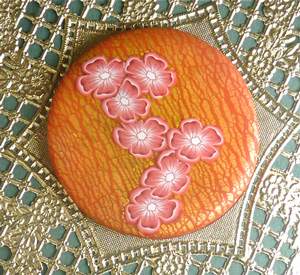
I was very pleased with the Pardo translucent. No problems at all.
Now I am off to try the metallics.
~ ~ ~ ~ ~ ~ ~ ~ ~ ~ ~ ~ ~
More Pardo Clay Projects
I purchased one of every color plus two whites and two translucent and, as you can see, I purchased some of the paints too.


The clay conditioned with ease and reduced wonderfully. So far I'm loving it. Very little distortion and the canes are easy to slice.
I used my extruder for this one, the one on the right is from left over clay. The clay is expensive so I don't want to waste a single bit.

This was an experiment.
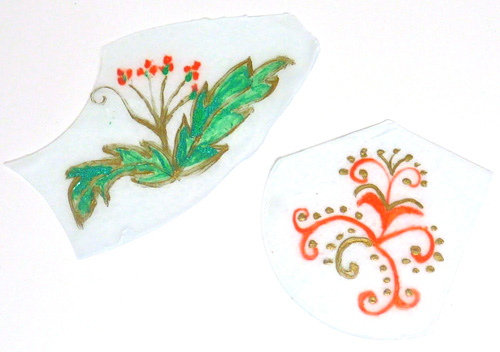
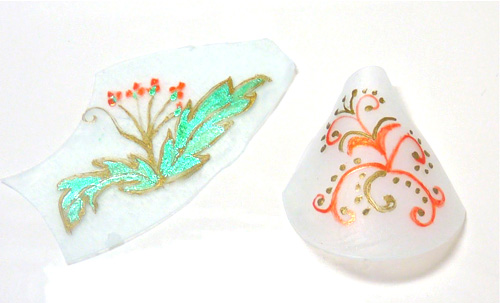
Next I am going to try it with the colored clay and see what happens. If the thin sheets are strong enough I would like to use them with wire. I have a plan in my head, now we will see if it works.
~ ~ ~ ~ ~ ~ ~ ~ ~ ~ ~ ~ ~
Pardo Clay Again
I did finish a few examples.
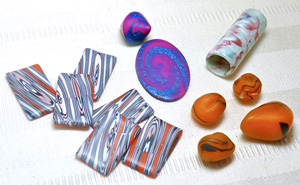
~ ~ ~ ~ ~ ~ ~ ~ ~ ~ ~ ~ ~
More Pardo Art Clay
Here is another cane with Pardo Professional Art Clay.
This is the cane before reduction.
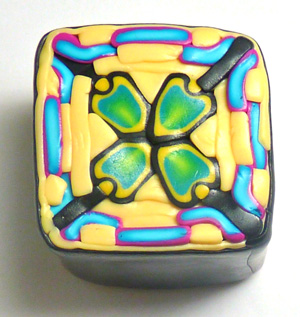
This is the cane after reduction. The other two are mini canes from scraps.
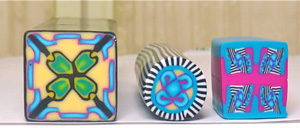
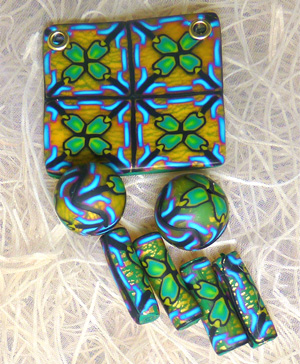
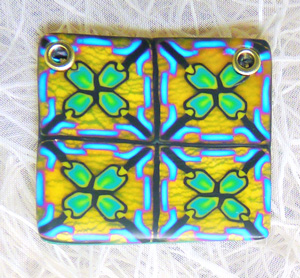
I haven't sanded and buffed the beads yet.
I used thinner slices of cane on the beads so the gold leaf shows up better.

~ ~ ~ ~ ~ ~ ~ ~ ~ ~ ~ ~ ~
I also tried tinting Pardo translucent with Viva Precious Metal paint.
 |
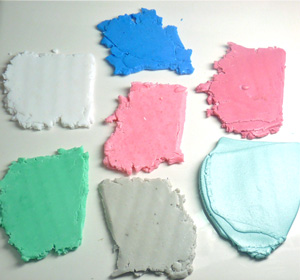 |
|
I conditioned the clay, divided a sheet of #1 thickness into 6 small pieces and then painted with the Viva paints. |
Here is how they look mixed in. As you can see I also added a piece that I'd made earlier with blue. Once the gold was mixed it it turned a yucky gray. |
|
The first is pearl, 2nd is coral, 3rd is crimson, the 4th is emerald, the 5th is gold and the last one is a mix of green and blue with a little gold that was left on the brush. I let them sit until the paint was dry, about an hour. By the way you can clean the brushes with soap and water. |
|

When all else fails... make swirlies. I'll try that tomorrow.
 |
Betty Jo Hendershott - Southern Illinois, United StatesI became interested in jewelry making after I retired. I started with polymer about 3 years ago, added wire work a year ago and have recently become interested in bead work. I like learning something new everyday, I hope you enjoy viewing my work. If you have questions, suggestions, compliments, critiques, I'd love to hear from you. |